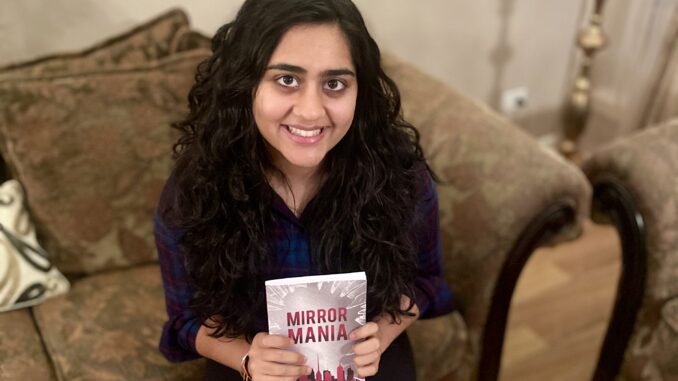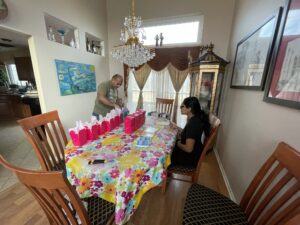
Published by: Sabah Ahmed
“You know, my mom always told me that you need to present yourself. Girls are supposed to look pretty. But when I looked at myself I could see broad shoulders and body hair. I felt the pressure. A lot of pressure”
Roveena Chand Jassal’s big, dark, beautiful eyes sparkled at the thought of this distant memory as she spoke about her past unsettled relationship with food.
Being born in an American Canadian household with Indian roots, Jassal knew early on that she did not blend in with the crowd. Going to school she recalls being one of the few students of color. The girls in her class were praised by boys for their blonde hair and blue eyes. And when Jassal looked at herself in the mirror she saw everything that was good enough but different. Her warm smile and her long dark locks, although the epitome of Indian beauty, were a constant reminder – she was distinct. Her young mind tried to grapple with the uncertainties regarding her identity, She used food for emotional buoyancy – it kept her afloat in the rough waters of her ever-changing self-image.
“I wanted to look good. Because to me, it meant I could control what people thought about me. I would write down the foods that I would eat every day by the hour. I would eat the same ten food because I had anxiety that if I ate something else I would gain weight.”
Food has a special place in all cultures. South Asian and Indian households consider meals an integral part of family bonding. They cook exotic and elaborate meals and find time to sit together to enjoy each other’s company. Coming from a family that considered healthy eating a blessing, Jassal was fighting a silent battle.

“I would literally cancel social events. One of my very very good friends, one of my best friends, [of] eight years, I missed two of her birthday parties because I was so scared that I wouldn’t look good at her party because I had gained two pounds that week. I was two pounds over the weight that I wanted to be. And I knew if I went to the party, there would be party food, and I just couldn’t handle it because if I went that meant I would gain more weight.”
Jassal, who is a media graduate of Western University of London, Ontario, has an artistic flair. She has always enjoyed creating art. Pretty much like most artists, Jassal has an empathetic nature. Being different was a daunting task for a sensitive soul like her. She was afraid to be like no one else. The wide-eyed girl thought that being different came along with its own baggage – one she wasn’t ready to carry yet.
“ I didn’t know what people thought of me. And I didn’t know what I wanted from myself.”
What Jassal was recalling was not merely a young girl struggling with an identity crisis, but a pattern prevalent among teenage girls in society. The majority of adolescents in Canada resort to extreme measures in an attempt to get the “ideal body.” Food is often viewed as a way to a good-looking body regardless of unhealthy it is.
Amidst this love-hate relationship that she had developed with food since the age of 8, deep down inside Jassal started to notice the emptiness that was filling her life.
“Being a creative person, I knew I need to channel these feelings into something and as I said, I always wanted to write a book but I just didn’t know what. And when I had the chance to I was reached out to by a professor at Georgetown University and he started this book creating organization. And we talked it over and I knew that I wanted to channel all these feelings of body image and food obsession, dealing with body standards, beauty standards, and put that into words so that other people can feel that they are actually heard and they are not alone like I felt.”
Jassal’s debut book “Mirror Mania” was published in December 2020 detailing her struggle with self-identity and ultimately self-acceptance. She sold around 110 copies in her first round and is gaining new readers every day.

Jassal’s story is of body dissatisfaction which is the root cause of eating disorders. According to Statistics Canada “Eating disorders are characterized by severely disturbed eating behaviors. They typically begin in adolescence or young adulthood and affect women ten times more than men.”
The two most common types of eating disorders are anorexia nervosa and bulimia. Although individuals with these disorders are dissatisfied with the way they appear, people with anorexia consider themselves in control of their bodies, in contrast to people with bulimia nervosa feel a lack of control
While Jassal narrated her story, I could hear the voices of thousands of girls both white and non-white who are bombarded with unrealistic expectations through social media. According to research carried out by the National Library of Medicine majority of Canadian females aged 12-29 years of age spend around 20 hours on the Internet each week leading to a higher rate of body dissatisfaction. Age groups that used lesser internet had fewer issues with their self-image.
In a world, where beauty standards change with online trends, Jassal’s book is helping hundreds of young girls to come to terms with their changing bodies.
“I started to reflect a lot and in the process, I learned that I wanted to help other people. Because I know this was and is a very difficult yet prevalent issue that many young men and women go through.”
Jassal’s book is available in both print and digital formats on Amazon, Indigo, and local bookstores.


Be the first to comment